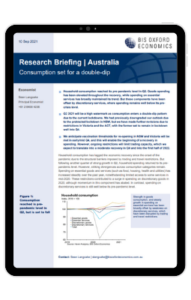Research Briefing
| Sep 17, 2021
Australia | Consumption set for a double-dip

Household consumption reached its pre-pandemic level in Q2. Goods spending has been elevated throughout the recovery, while spending on essential services has broadly maintained its trend. But these components have been offset by discretionary services, where spending remains well below its pre-crisis level.
What you will learn:
- Q2 2021 will be a high watermark as consumption enters a double-dip pattern due to the current lockdowns. We had previously downgraded our outlook due to the protracted lockdown in NSW, but we have made further revisions due to restrictions in Victoria and the ACT, with the former set to remain in lockdown well into Q4.
- We anticipate vaccination thresholds for re-opening in NSW and Victoria will be met in early/mid Q4, and this will enable the beginning of a recovery in spending. However, ongoing restrictions will limit trading capacity, which we expect to translate into a moderate recovery in Q4 and into the first half of 2022
- Strength in goods consumption, and steady growth in spending on essential services has been broadly offset by weakness on discretionary services, which have been disrupted by trading and travel restrictions.
Tags:
Related Services

Post
US Key Themes 2026: Exceptionalism amid fragmentation
US exceptionalism is alive and well, and that won't change in 2026.
Find Out More
Post
Global Key themes 2026: Bullish on US despite AI bubble fears
We anticipate another year of broadly steady and unexceptional global GDP growth, but with some more interesting stories running below the surface.
Find Out More[autopilot_shortcode]
